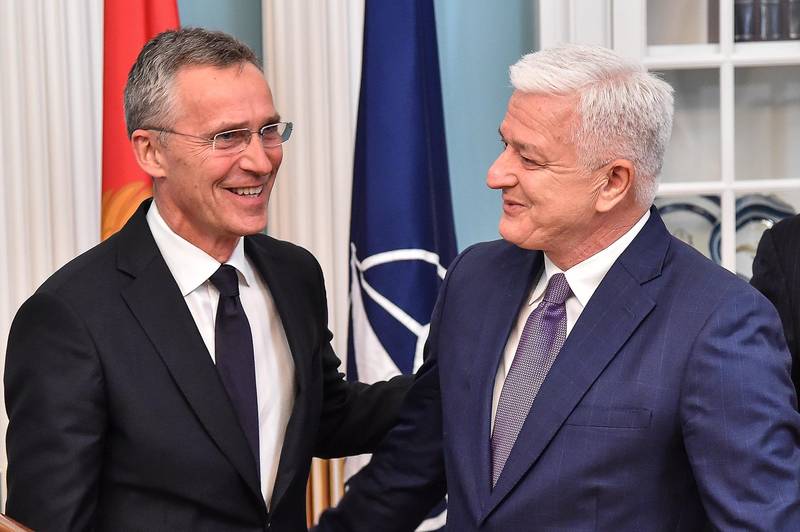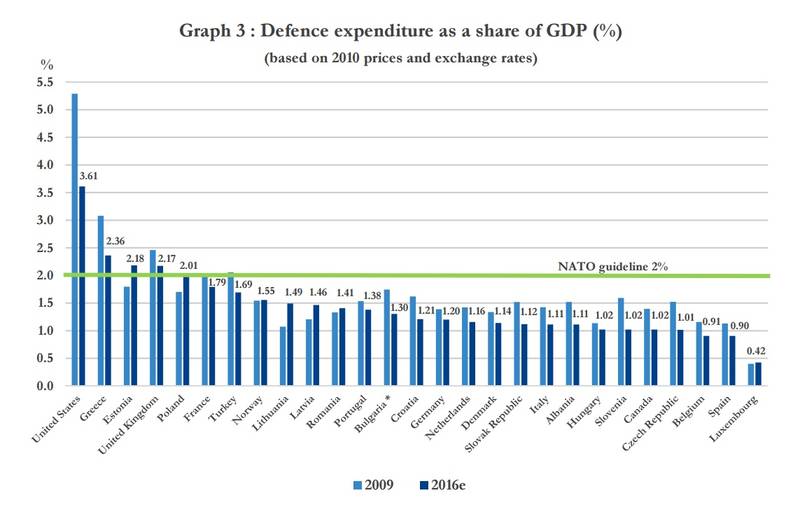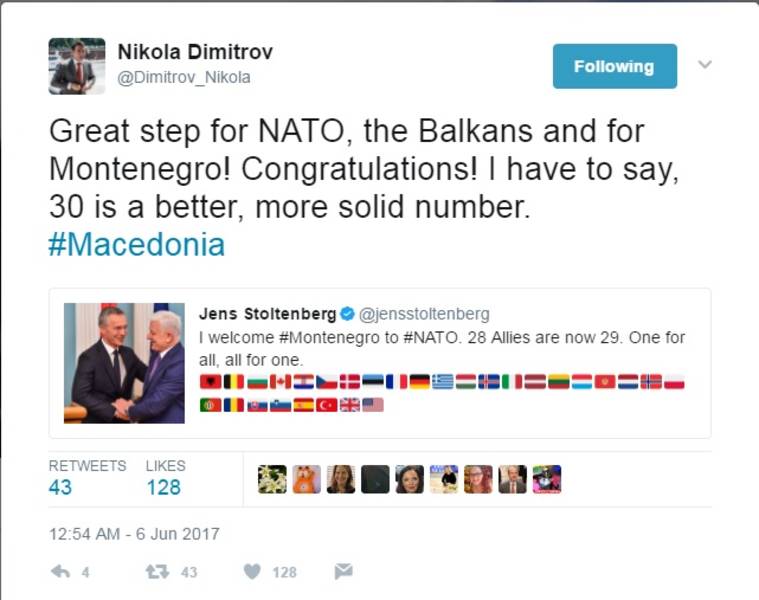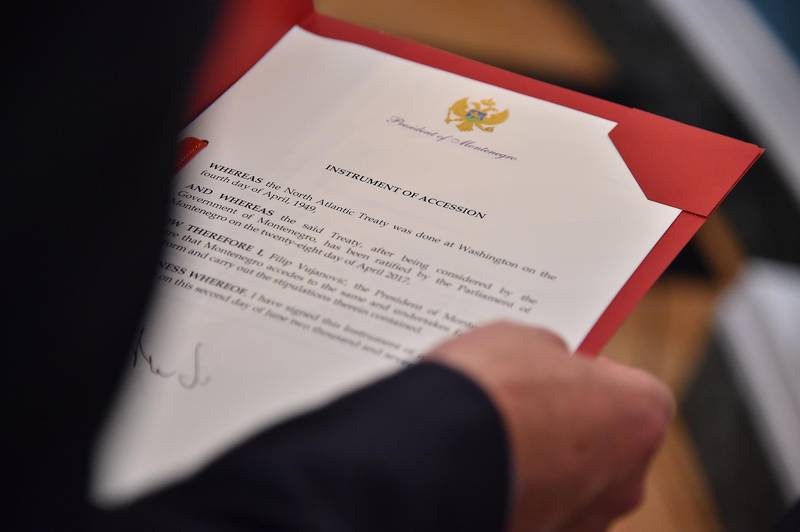NATO Enlargement in Times of Geopolitical Cholera
Adelina Marini, June 7, 2017
Do you remember that scene at the NATO summit on May 25 when US President Donald Trump arrogantly pushed aside Montenegrin Prime Minister Duško Marković to stand in front? This was the most shared video of that day and is the best illustration of the enlargement of the Pact, which officially took place on 5 June. On that day the Pact accepted its 29th state - Montenegro. During the official ceremony NATO Secretary General Jens Stoltenberg chose to quote President Harry S. Truman’s words at the signing of the Washington Treaty in April 1949: "In this Pact, we hope to create a shield against aggression and the fear of aggression. A bulwark which will permit us to get on with the real business of government and society. The business of achieving a fuller and happier life for all our citizens".
Article 5 – with or without the USA?
Jens Stoltenberg also stressed that Article 5 of the Pact, "our collective defence pledge, is the core of our Alliance. A unique bond that has kept our nations safe for almost seven decades". Stated only days after the NATO summit, which served to break the illusion that Mr Trump is a reliable partner, the Article 5 statement sounds unconvincing. The American Politico revealed on the very day of Montenegro's accession that, despite the efforts of the presidential administration, Donald Trump has removed from his speech in Brussels the sentence that reaffirms the US commitment to Article 5, which guarantees that an attack on one member of the pact is an attack on everyone.

Facing the amazed members of his administration and his NATO partners, who were eagerly awaiting the statement, Donald Trump said something else. He said NATO's future should include a greater focus on terrorism and migration, as well as threats from Russia and on the Eastern and Southern borders of NATO. In an attempt to paste over the awkward situation, the White House explained that it was precisely this part that served as a reaffirmation of US commitment to the pact and its backbone, Article 5. Further on Trump attacked the other members of the Pact for not meeting their commitments to set aside 2% of their gross domestic product for defence.
According to NATO figures from March of this year, there are just a few members that in the year 2016 have set aside 2% of GDP. These are Greece (2.36%), Estonia (2.18%), the United Kingdom (2.17%) and Poland (2.01%). The newest member of the Pact sets aside 1.6% of its GDP for defence, ranking in the second line among countries such as Turkey (1.69%) and Norway (1.55%). NATO figures also show that only five countries have increased their defence spending compared to 2009. These are Estonia, Poland, Latvia (to 1.46%), Lithuania (to 1.49%) and Romania (to 1.41%).

This transition in Trump's speech can be interpreted as a direct link between Article 5 and defence spending. "2% is the bare minimum for confronting today’s very real and very vicious threats. We will never forget the lives that we lost, we will never forsake the friends that stood by our side and we will never waver in our determination to defeat terrorism and achieve lasting security, prosperity and peace", said Donald Trump, which can also be perceived as confirming the US's commitment to the foundations of NATO. Given the unpredictable nature of the US president, it is difficult to say for sure whether that is the case.
For a country like Montenegro, with a population of just over 600 000 people, located in a geopolitically contested region, Article 5 means a lot. It is a guarantee of its security and integrity. Last year, an attempted coup and assassination attempt against the then Prime Minister Milo Đukanović was prevented in the very night of the October 16 parliamentary elections. Montenegrin authorities have accused Russia of organising it with the help of Serbian intelligence agents. The coup was prevented thanks to the intervention of Aleksandar Vučić, then prime minister of Serbia. An investigation is currently underway, but whatever comes out of it Russia's resistance to Montenegro's accession to NATO has never been concealed.
Immediately after the official ceremony in NATO, the Russian foreign ministry threatened Montenegro with retaliatory measures. The official statement of the ministry says: "In the light of the hostile course chosen by the Montenegrin authorities, the Russian side reserves the right to take retaliatory measures on a reciprocal basis. In politics, just as in physics, for every action there is an opposite reaction". Montenegro's accession to NATO coincided with the discovery of a network of journalists from the Western Balkans about Russia's subversive role in Macedonia as well, which last week finally came out of the political crisis that has been shaking the former Yugoslav Republic for two years. Moscow rejected the allegations of the journalists that were also published in the British left-liberal daily newspaper The Guardian.
The problem is not just how clearly stated Donald Trump's support for Article 5 of the NATO treaty is. A much more serious problem is the doubts about relations between his administration and Vladimir Putin's regime in the Kremlin. Scandalous revelations have been shaking the White House since Donald Trump assumed office officially in January. Back during the election campaign, he announced an intention of rapprochement with Mr Putin, but since then his moves have been controversial and the Russian president's frustration has been growing. Moreover, there is still doubt that Russia has interfered in the US election process.
At the NATO summit, Trump pointed at Russia as a risk but only a few hours earlier, during his meeting with EU institutional leaders Donald Tusk (Poland, EPP) and Jean-Claude Juncker (Luxembourg, EPP), it became clear that the main differences are precisely in relation to Russia. Moscow has repeatedly claimed the Balkans as a part of its sphere of influence. The only countries in the peninsula that are not yet in NATO, neither are going to be any time soon, or have no intention to are Serbia, Macedonia, Bosnia and Herzegovina, Kosovo. Serbia is consistent in its NATO neutrality policy but maintains serious military and other ties with Russia.
Macedonia’s road to NATO is blocked by Greece due to the unresolved dispute over the name of the former Yugoslav Republic, but the country has a firmly declared interest in joining, confirmed also by the country's new prime minister, Zoran Zaev. On the occasion of Montenegro's accession, Macedonian Foreign Minister Nikola Dimitrov hinted on Twitter that he hoped Macedonia would soon become the 30th member. Bosnia and Herzegovina is divided on the issue, with leaders in the Republika Srpska entity strongly opposed to joining the Alliance. BiH's Euro-Atlantic future is fully tied to Belgrade's position, and Moscow, respectively. Kosovo does not have its own army, but insists that it should, and this is one of the many tension points between Priština and Belgrade. At this stage, there is no support even in Brussels (including NATO headquarters) for Kosovo to get its own army because of the current high tension in the region and especially on the Priština-Belgrade axis.

An Alliance of democracies?
At the ceremony for admitting Montenegro to NATO, Jens Stoltenberg said something else that is currently being questioned in the organisation: "We are an alliance of democracies. And we have, at times, different political perspectives". Montenegro itself has serious democratic deficits, as the European Commission's annual progress reports show, as well as its place in the index of democracy and freedom of the press. Even more serious problems, however, are the ones of Turkey, whose NATO membership has already been questioned. Deterioration of democracy is also seen in other member states, which poses a risk to the Alliance's integrity, but also to the security of its members. Recently, during a hearing in the European Parliament's foreign affairs committee, Jens Stoltenberg placed defence before the democratic values precisely on the subject of Turkey.

The congratulations that the Montenegrin prime minister received from Vice President Mike Pence (not from Donald Trump) in Washington cannot obscure the challenges the Pact faces. Today, like never before, it cannot be said for sure whether if a member is attacked, everyone will stand as one behind it. And while Montenegro was expecting the last signatures of the ratification process, the EU has begun work on building a NATO alternative - a defence union.
Translated by Stanimir Stoev
 Bakir Izetbegovic, Andrej Plenkovic | © Council of the EU
Bakir Izetbegovic, Andrej Plenkovic | © Council of the EU Aleksandar Vucic, Recep Tayyip Erdogan | © Serbian Presidency
Aleksandar Vucic, Recep Tayyip Erdogan | © Serbian Presidency Jean-Claude Juncker, Zoran Zaev | © European Commission
Jean-Claude Juncker, Zoran Zaev | © European Commission